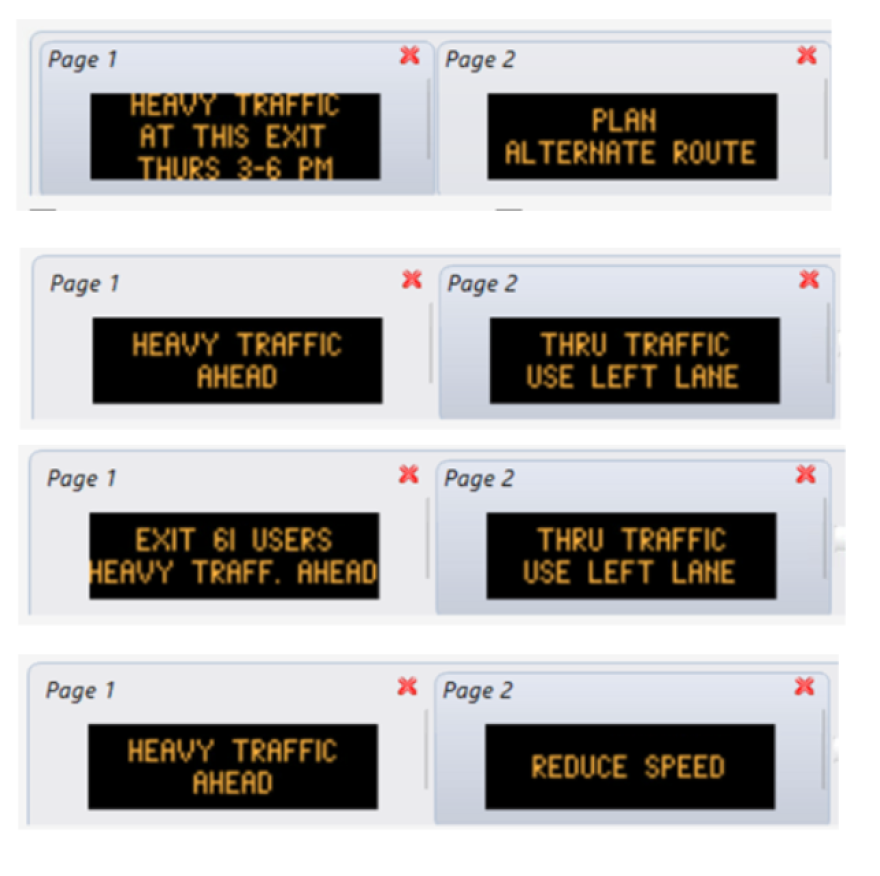Gov. Kristi Noem's office ordered state agencies to provide a border-to-border escort and supportive billboard messages for a convoy of truckers opposing COVID-19 restrictions.
"SD LOVES TRUCKERS" and "DRIVE SAFE," truckers read as they traveled east on Interstate 90 with an escort from the Highway Patrol.
"The Noem Administration wanted to ensure that the trucker convoy felt welcome and respected in South Dakota, and that they could traverse the state safely without disrupting traffic," said Ian Fury, Gov. Noem's spokesman, in an email.
Fury said the governor's office asked the Highway Patrol to provide three troopers for the escort, and the Department of Transportation to program messages on digital billboards owned and operated by the state along I-90.
The convoy, part of the Freedom/People's Convoy movement, passed through the state last Thursday and Friday en route to a Washington, D.C., protest.
The official People's Convoy group is calling on governments to end any state-of-emergency declarations and mask or vaccine mandates so Americans "can get back to work in a free and unrestricted manner."
The U.S. convoy movement was inspired by Canadian truckers who protested the same issues by occupying the streets of Ottawa.
It's unclear how many truckers participated in the convoy that traveled through South Dakota.
The Department of Public Safety said it did not have an official number and did not have an estimate. It referred SDPB News to the leader of the convoy, who did not respond to a message.
Democrat critical of actions
State Rep. Jamie Smith, a Democrat who is seeking his party's nomination to challenge Noem in the November general election, said it appears the Noem administration's moves were more about politics than highway safety.
"If it truly was just providing safety, we do have an obligation in our state to do that," Smith said. "But it appears to me that it made it look like they were perhaps supporting this event."
Smith said elected officials have a right to engage in political activities, but not to support those activities with public resources.
"I think it's different when you provide the support and ask departments to support the action," Smith said.
Fury said the Noem administration's actions were "absolutely appropriate."
Fury also provided a written statement from Craig Price, secretary of the Department of Public Safety.
“Anytime you have a large number of vehicles in a parade or convoy of this nature, it makes perfect sense to offer an escort for highway safety purposes. The Highway Patrol has provided these services dozens of times over the years for a variety of groups," Price said.
Fury echoed, "It is not uncommon for Highway Patrol to provide escorts for something of this nature."
Fury did not provide examples when SDPB News asked for them.
Federal guidelines on billboard messages
The state DOT follows the 2009 Edition of the Manual on Uniform Traffic Control Devices, which addresses digital billboards.
The manual says, "Changeable message signs shall display only traffic, operational, regulatory, warning, and guidance information."
The manual provides examples including warnings about the weather, lane closures, speeding and travel times. The guidelines do not list general friendly or welcome messages as an allowed type of message.
SDPB asked the state DOT if it believes the "SD LOVES TRUCKERS" message falls within the guidelines.
"DOT’s intent was to bring attention to the potential increase in traffic and provide a general safety message for this planned traffic event through South Dakota," Craig Smith, DOT director of operations, wrote in an email.
Smith called the message for the truckers an example of "general safety messages" and compared it to other messages from a DOT highway safety campaign.
He provided examples of those messages, including one that said, "RAISE YOUR RIGHT FOOT IF YOU HATE SPEEDING TICKETS." The other examples were all standard traffic commands and advisories, including "REDUCE SPEED" and "HEAVY TRAFFIC AHEAD."


Noem campaign shares welcome sign
Fury said the idea for the digital billboard messages came from the governor's office and DOT.
He said three Highway Patrol troopers assisted with the convoy and others were visible along the interstate in case any problems arose.
"The costs associated with this would not be any different than the average day of a state trooper patrolling our highway," Fury said via email.
He did not respond when asked if Noem supports the tactics of Canadian and U.S. trucker-protesters, which have included blocking traffic in Ottawa and circling the highways around D.C.
Fury provided this written statement from Noem: “Truckers keep this country moving when all other systems fail. They are crucial to our supply chain. They come through for South Dakota day-in and day-out to deliver fuel and keep our store shelves stocked. I absolutely agree that South Dakota loves our truckers."
Noem's reelection campaign posted a video about the convoy on her social media channels that includes footage of the billboard.
But the Kristi for Governor campaign was not involved in ordering the escort or billboard messages, according to Fury and Noem's campaign manager, Joe Desilets.
In our great state of South Dakota, we believe in freedom - not mandates. As Governor, I will always support the men and women who drive endless hours across the nation. In doing so, means not bowing to Biden’s radical policies. SD loves our truckers! pic.twitter.com/gCLrfjjhQr
— Kristi Noem (@KristiNoem) March 7, 2022
Desilets said a campaign team member filmed footage on the interstate but "the campaign didn't ask for this to be set up, pay for it to be set up, etc."
Noem wrote on social media, "In our great state of South Dakota, we believe in freedom — not mandates. As Governor, I will always support the men and women who drive endless hours across the nation.".


